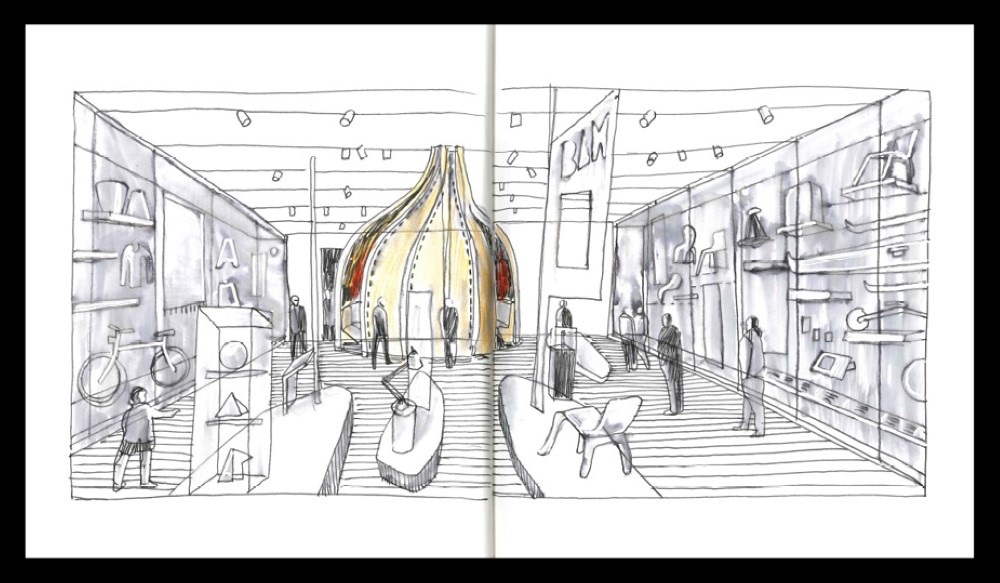Join us for ICOM General Conference Dubai on-site or online!
November 12, 2025
The full program of our three sessions and the IC day are online here.
There are three ICOM–DESIGN sessions held at the Dubai General Conference and one IC Day of site visits:
- A-10 (DESIGN, GLASS) - Adornment and Identity (12th November 2025)
- B-7 (DESIGN, DEMHIST) - Adornment and Identity in Spatial Design and Objects (12th November 2025)
- C-7 (COSTUME, DESIGN) - Adornment and Identity (13th November 2025)
- IC Day - Dubai’s Decorative Arts, Design, and Intangible Heritage (15th November 2025, all day)
REGISTRATION OPEN: "Design Collection Displays Reassessed" in Oslo
September 23, 2025
For registration, click here: Design Collection Displays Reassessed – Nasjonalmuseet
_(2).jpg) Premeditated, Nye Nasjonalmuseet (2022) (2), CC BY-SA 4.0
Premeditated, Nye Nasjonalmuseet (2022) (2), CC BY-SA 4.0
Welcome to ICOM-DESIGN’s international symposium at the National Museum of Art, Architecture and Design, Oslo!
The Design Collection Displays Reassessed symposium will explore collection displays as sites of knowledge exchange and active engagement. It will interrogate how design objects and interiors are displayed, discussed and interpreted, and for whom. What does curating these kinds of collection displays represent and mean today? And how might this practice look in the future? What new museological approaches are needed? We look forward to meeting in person to discuss and debate an ever-changing field – a conversation between scholars and practitioners across borders, institutions and disciplines.
Keynote speakers are Corinna Gardner, Senior Curator, Design and Digital, Victoria and Albert Museum, London, Dr Sebastian Hackenschmidt, Curator of Furniture and Woodwork, MAK – Museum für angewandte Kunst, Vienna, Marco Magni, founder and chief architect, and Maria Cristina Rizzello, architect and partner, Guicciardini & Magni Architetti, Florence, and Dr Leena Svinhufvud, Lead Researcher, Architecture & Design Museum, Helsinki; all leading scholars within the field. The other speakers, all international, will contribute with talks grouped according to the following themes: Approaches to Reinstallations, Perspectives on House Museums, Sustainability and Self-Questioning, Design Mediating Design or Exploring Process and On Specificity and Subject Matter.
ICOM DESIGN Talk: "The Shakers: A World in the Making" on September 25, 2025
September 23, 2025
Thursday September 25, 2025, 16:00 Paris, 10:00 New York, 23:00 Tokyo
Online Zoom Meeting (approx. 1 hour program)
This talk will explore the exhibition The Shakers: A World in the Making. Co-organized by Vitra Design Museum, Institute of Contemporary Art Philadelphia, and the Milwaukee Art Museum, with significant support from the Shaker Museum, the exhibition explores the architecture, design, and material culture of the Shakers, a religious community founded in the late 18th century in the United States.
Organized around principles of communitarianism, pacifism, and celibacy, the Shakers made much of what they needed to build and maintain their communities, largely separated from the rest of the US. A World in the Making also features seven contemporary artists and designers, whose newly-commissioned works sit in dialogue with Shaker objects and invites visitors to consider how the Shakers might provide insight into the challenges and questions of contemporary life.
Join co-curators Mea Hoffmann (VDM), Hallie Ringle (ICA Philadelphia), and Shoshana Resnikoff (MAM) as they detail the development of the exhibition, its themes, and the many challenges and opportunities presented by the rich and complex history of the Shakers.
Register here!
You will be sent a link shortly before the program.
This ICOM DESIGN organised talk is the ninth in a series of online conversations with decorative arts and design professionals.
Andreas Hug's talk "Archiving Moholy-Nagy: A Bauhaus Legacy in America" now available online
August 4, 2025
Andreas Hug's ICOM DESIGN Talk "Archiving Moholy-Nagy: A Bauhaus Legacy in America", held on October 17, 2024, is now available online through this link.
In this presentation, Moholy-Nagy Foundation archivist Andreas Hug, grandson of the artist, discussed the digitalization of the extensive archives of the Hungarian artist and Bauhaus professor László Moholy-Nagy (1895–1946). After working in Hungary, Germany, the Netherlands, and England in the early twentieth century, Moholy-Nagy moved with his wife Sibyl Moholy-Nagy (1903–1971) and young daughters Hattula (b. 1933), and Claudia (1936–1971) to the United States in 1937, where he founded the School of Design in Chicago, known as the New Bauhaus.
When asked, please enter this code: ^9t.yDYS
Oslo Call for Papers out now: Design Collection Displays Reassessed
June 29, 2025
ICOM-Design International Symposium

National Museum, Oslo
28–30 October 2025
Post-Symposium 31 October–1 November 2025
Deadline: 29 July 2025
For more information on how to apply click here.
The Design Collection Displays Reassessed symposium will discuss collection displays as sites of knowledge exchange and active engagement. The new National Museum of Art, Architecture and Design, Oslo, a merger of four previously independent museums, is a fitting venue for a symposium with this theme. It opened its new, large-scale collection display in 2022, including decorative arts, design, interiors, fashion and studio crafts from the 1100s to the present.
Keynote Speakers
- Corinna Gardner, Senior Curator, Design and Digital, Victoria and Albert Museum, London
- Dr Sebastian Hackenschmidt, Curator of Furniture and Woodwork, MAK – Museum für angewandte Kunst, Vienna
- Marco Magni, founder and chief architect, and Maria Cristina Rizzello, architect and partner, Guicciardini & Magni Architetti, Florence
- Dr Leena Svinhufvud, Leading Researcher, Architecture & Design Museum, Helsinki
Image: Marco Magni, Guicciardini & Magni Architetti, sketch for Room 21, the collection display, National Museum, Oslo. Photo: Mario Ciampi